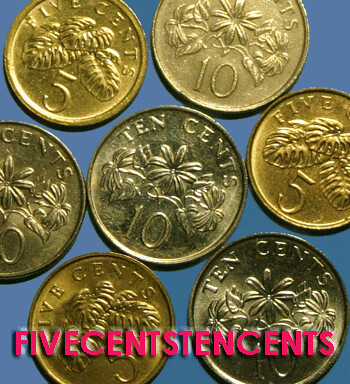Staying on course in equities
 Why invest in stocks and shares (equities)
Why invest in stocks and shares (equities)
Investing in stocks and shares (equities) is not without risk. Prices of shares can go up and they can go down. However, one of the historical facts that most investment books will tell you is that over the long term of 20-30 years, investments in shares have generally beaten the rate of inflation.
Inflation eats into the purchasing power of our savings
In Singapore, recent data for August 2007 inflation rate or the Consumer Price Index shows an increase of 2.9%. This is the comparison against the rate of inflation in August 2006. It is not difficult to see from our own experiences of the increase in the prices of drinks in coffeeshops and foodcourts as well as increase in prices of groceries that inflation is happening in the booming Singapore economy.
One of the reasons I became interested in investing in equities was that it provided you with an investment asset that could yield dividends in excess of the bank savings rate of 0.25% or even treasury bills at around 2%+ or fixed deposits. The rate of inflation in Singapore is guaranteed to be higher than the 0.25% savings we are getting from our bank savings, hence, in order for us not to see our purchasing power decline, we have to look for higher yielding investments.
Advantages and benefits of investing in equities
The main advantage of investing in equities is that if the company is profitable and growing in its earnings, the share price will tend to rise to reflect its growth and prospects. In addition, if you invest in sound, well-run companies in businesses that are growing in tandem with the growing economy, such companies tend to reward investors with dividends and the discounted cash flows from its future earnings will be reflected in its share price.
Historically, if you had invested in the S&P500 for the last 20 years and benchmarked it against the rate of inflation, you would have easily beaten the rate of inflation from your investments.
When you invest in a company's shares, you are participating in the profits (and possible losses) of the company. The company works to make money for you day and night since management is there to oversee the operations and companies that pay dividend generate passive income even while you are working on your day-job.
Disadvantages and risks of investing in equities
In reality, share prices can go up and they can go down even if the fundamental business of the company is sound, it is profitable and it is paying dividends. For instance, the recent sub-prime issues arising from the US affected many blue-chip shares in Singapore Exchange even those that did not have much exposure to it as the US New York Stock Exchange and consumer sentiment about the liquidity crunch affected investors short-term expectations of share prices.
The STI dropped to 2900+ levels even when fundamentally the Singapore economy was on track and poised to hit the 4-6% growth estimates by the Government. Therein lies the risk of the stock market. As much as the prices of stocks theoretically are expected to reflect the future earnings of a company, it is also driven by investors sentiment and expectations of the fair value of these companies given all the various factors. Therefore, even if the Singapore economy is on track for a good performance and companies are on track with profit estimates, share prices in the short-term can fluctuate wildly and if you are strapped for cash and need to sell your shares to raise money to pay for your car or house loans, then you would have been hit very hard and made big capital losses on your share investments.
Investing in equities also requires some degree of understanding of the stock market and about stocks and shares and the company's business in general. However, if you are interested to become financially free, to grow your retirement nest and to be responsible for your own financial situation, then it is not a black box you should be afraid of!
I too knew little about the stock market until the Singtel initial public offer turned almost 1 in 3 Singaporeans into share owners. However, it was not until 2003 that I really got involved in managing my own money and actively investing in the stock market.
My track record has been reasonable as I managed to achieve 8-10% compounded annual grow rate in my returns over the last 5 years. It is not the Berkshire Hathaway standard but it beats the rate of inflation hands-down.
If you apply the rule of 72 to 8%, then my investments will double in value in 72/8=9 years' time. :-)
Decide for yourself
Before you decide for yourself whether you have what it takes to invest in the equity market. Do consider the following:
- Your risk tolerance
- Your investment horizon (time period)
- Your targetted rate of return
- Your own personality, knowledge and skill
Remember, doing nothing or investing in fixed deposits and treasury bills alone is also risky. The risk comes in inflation eroding away the value of your savings. Investing in equities comes with a much higher risk that investing in fixed deposits and equities and you must know what you are doing. But there is no perfect investment that yields a high return and virtually no risk.
Whatever you choose, be well and prosper.










